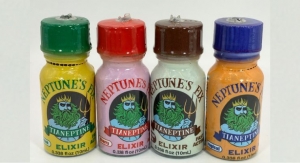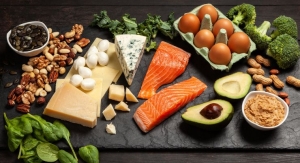By Mike Montemarano, Associate Editor07.18.22
Understanding about the role bacteria in the gut plays in influencing health continues to advance, but consumers still have a lot to learn. In the world of nutritional ingredients, probiotics are a relatively nascent category with strong consumer recognition. Even newer to the scene are prebiotics and postbiotics, terms that consumers overall are less clear about.
Growing prevalence of gut-related conditions, and demand for products that may offer gut-health benefits, will drive knowledge about the differences among these ingredients and how they work, according to Will Cowling, marketing manager of the consumer research company FMCG Gurus.
At Vitafoods Europe, held in Geneva, Switzerland in May, Cowling offered insights from global consumer surveys on gut health, the microbiome, and nutritional ingredients.
“The fact that society is aging is resulting in higher rates of problems such as difficulty digesting food,” Cowling said. “Poor dietary habits, like over-indulgence and unhealthy meal timing, is also contributing to the prevalence, resulting in both immediate and long-term health problems. Time scarcity is a key barrier to digestive health. People are skipping meals, and turning to confectionery and convenience foods, and there are also financial challenges associated with leading healthy lifestyles.”
For most consumers, satisfaction with their gut health is declining, according to a 2022 survey by the market research firm. As a result, 56% of global consumers, of all ages, said they plan to address their digestive health over the next 12 months.
Globally, only 15% of consumers have heard of the “gut microbiome.” Of the consumers who believe they know what the gut microbiome is, 50% have made changes to diets or lifestyles to improve their own gut microbiome, mostly through diet modification.
Among consumers who have heard the term “gut microbiome,” the top changes consumers have made to address their gut health is to eat more fruit (72%), increase fiber intake (64%), and reduce intake of sugar (61%).
Only 67% of consumers are aware that bacteria exist within the digestive system, Cowling added. Of these consumers, 65% said they are aware that bacteria within the digestive system may be beneficial to health.
“It’s very important not to overestimate the awareness of probiotics and the gut microbiome. Consumers don’t know the difference between various strains, or how prebiotics, probiotics, and postbiotics function differently,” Cowling noted.
The knowledge gap for prebiotics and postbiotics is significant, especially compared to probiotics. According to FMCG Gurus surveys, only one in five consumers have heard of prebiotics and purchased them within the last year. Meanwhile, only one in 10 consumers said that they’ve heard of the term “postbiotics” in 2022.
“Most consumers don’t know the difference between these terms, and brands should explain how they differ and complement each other. Especially for postbiotics, claims might not be overly-influential,” Cowling said.
Globally, the portion of consumers that said they’ve purchased digestive health products went from 15% in 2020 to 24% in 2022, mostly due to the fact that probiotic claims are more popular in dairy products, breakfast cereal, snacks, and plant-based foods.
Skepticism about digestive health products persists, according to Cowling, who noted widespread beliefs that brands use misleading health claims in order to drive prices and sales. “Brands need to lead with science in order to establish trust. Claims must be fully supported by science, but still simple enough for consumers to understand and make decisions with.”
Mike Montemarano has been the Associate Editor of Nutraceuticals World since February 2020. He can be reached at MMontemarano@RodmanMedia.com.
Growing prevalence of gut-related conditions, and demand for products that may offer gut-health benefits, will drive knowledge about the differences among these ingredients and how they work, according to Will Cowling, marketing manager of the consumer research company FMCG Gurus.
At Vitafoods Europe, held in Geneva, Switzerland in May, Cowling offered insights from global consumer surveys on gut health, the microbiome, and nutritional ingredients.
Gut Feelings
Globally, digestive health complaints among consumers are on the rise, according to FMCG Gurus surveys. Between 2018 and 2020, the proportion of consumers complaining about gas increased from 15% to 21%. Similar trends were seen in gluten sensitivity/intolerance (up from 10% to 20%), bloating (up from 12% to 19%), stomach aches (up from 12% to 28%), and constipation (up from 13% to 18%).“The fact that society is aging is resulting in higher rates of problems such as difficulty digesting food,” Cowling said. “Poor dietary habits, like over-indulgence and unhealthy meal timing, is also contributing to the prevalence, resulting in both immediate and long-term health problems. Time scarcity is a key barrier to digestive health. People are skipping meals, and turning to confectionery and convenience foods, and there are also financial challenges associated with leading healthy lifestyles.”
For most consumers, satisfaction with their gut health is declining, according to a 2022 survey by the market research firm. As a result, 56% of global consumers, of all ages, said they plan to address their digestive health over the next 12 months.
Terminology
When it comes to defining key terms related to gut health and the microbiome, brands have an opportunity to build trust by bridging a substantial knowledge gap.Globally, only 15% of consumers have heard of the “gut microbiome.” Of the consumers who believe they know what the gut microbiome is, 50% have made changes to diets or lifestyles to improve their own gut microbiome, mostly through diet modification.
Among consumers who have heard the term “gut microbiome,” the top changes consumers have made to address their gut health is to eat more fruit (72%), increase fiber intake (64%), and reduce intake of sugar (61%).
Only 67% of consumers are aware that bacteria exist within the digestive system, Cowling added. Of these consumers, 65% said they are aware that bacteria within the digestive system may be beneficial to health.
“It’s very important not to overestimate the awareness of probiotics and the gut microbiome. Consumers don’t know the difference between various strains, or how prebiotics, probiotics, and postbiotics function differently,” Cowling noted.
The knowledge gap for prebiotics and postbiotics is significant, especially compared to probiotics. According to FMCG Gurus surveys, only one in five consumers have heard of prebiotics and purchased them within the last year. Meanwhile, only one in 10 consumers said that they’ve heard of the term “postbiotics” in 2022.
“Most consumers don’t know the difference between these terms, and brands should explain how they differ and complement each other. Especially for postbiotics, claims might not be overly-influential,” Cowling said.
Driving the Category Forward
On that note, consumers are more likely to take generalized steps rather than specific actions to address their digestive health, mostly turning to overall dietary patterns and exercise. “They tend to turn to food and drink over supplements due to ease of daily use, and concerns about the safety and side effects of supplementation,” Cowling said, noting that the onus will be on the industry to demonstrate the safety of supplement products.Globally, the portion of consumers that said they’ve purchased digestive health products went from 15% in 2020 to 24% in 2022, mostly due to the fact that probiotic claims are more popular in dairy products, breakfast cereal, snacks, and plant-based foods.
Skepticism about digestive health products persists, according to Cowling, who noted widespread beliefs that brands use misleading health claims in order to drive prices and sales. “Brands need to lead with science in order to establish trust. Claims must be fully supported by science, but still simple enough for consumers to understand and make decisions with.”
Mike Montemarano has been the Associate Editor of Nutraceuticals World since February 2020. He can be reached at MMontemarano@RodmanMedia.com.




























